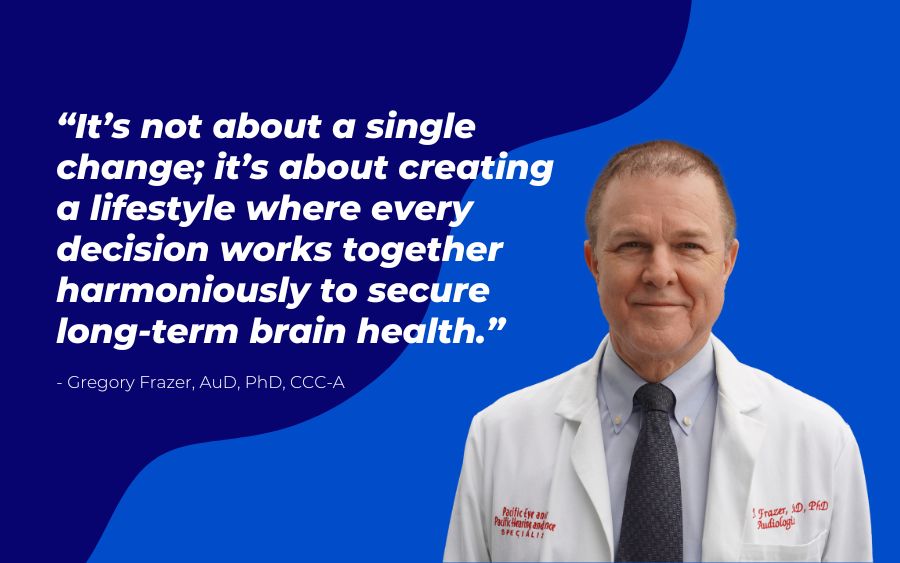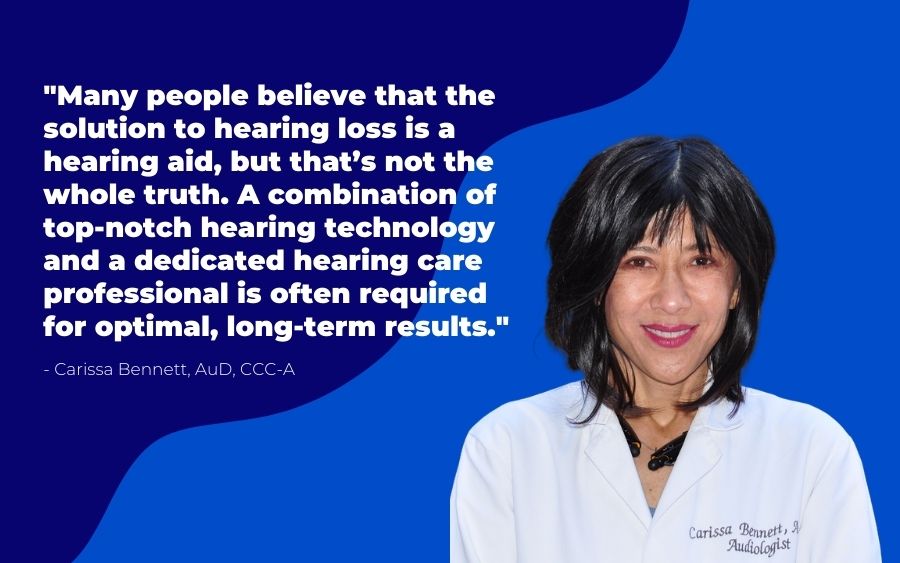Understanding Dementia: A Growing Concern
Imagine that you’re listening to a story being told by a loved one at the dinner table, but you’re missing every few words due to loud background noise. Without the full picture, your version of the story is slightly muddled, with missing information.
While this isn’t a huge deal when you’re first listening to the tale, trying to recall it later will prove difficult without having heard the entire thing, and your memory of the dinner with your loved one is foggier as a result.
It may be surprising, but hearing challenges affect far more than your ears – your memory and cognitive skills suffer as a result of untreated hearing loss and can inadvertently increase your risk of dementia.
You may have read that over 6 million Americans currently live with dementia. Projections from the National Institutes of Health highlight that this number could double by 2060.
Dementia affects more than just your memory; it disrupts communication, independence, and your overall quality of life. You can empower yourself to slow down the progression through risk reduction.
Recognizing the signs and taking action with lifestyle strategies is key to securing your future cognitive well-being.
Lifestyle Habits to Support Brain Health
Each day presents you with an opportunity to nurture your mind and body. Recent studies have revealed different ways to address your risk of dementia through lifestyle changes and wellness exercises to prioritize not just your bodily health but your brain health, too!
Exercise
Exercise improves cardiovascular health, which in turn enhances blood flow to the brain – essential for memory and cognitive functions. Routine physical activity, such as brisk walking, cycling, or swimming, may also provide additional benefits if you’re genetically predisposed to Alzheimer’s. By staying active, you reduce your risk of chronic illnesses that could further compromise brain function.
Mediterranean Diet
You can help fortify your brain’s defenses by choosing a nutrient-rich Mediterranean diet. This eating plan emphasizes plenty of fruits, vegetables, whole grains, fish, and olive oil.
Such foods are packed with antioxidants, healthy fats, and essential vitamins that support memory and reduce inflammation. When you focus on wholesome, balanced meals, you’re feeding your brain the tools it needs to thrive and slow down cognitive decline.
Sleep
Quality sleep is not a luxury – it’s a necessity for brain health. You benefit from consistent, restorative sleep, ideally around 7–8 hours per night, as this is when your brain consolidates memories and clears out toxins.
Inadequate sleep can not only increase your risk of cognitive decline but also disrupt your overall health. By prioritizing a healthy sleep routine, you give your brain the time it needs to rejuvenate, ensuring healthy memory and a well-rested beginning to each day.
Mental Stimulation
Keeping your brain active is vital; whether you’re solving puzzles, reading books, engaging in a new hobby, or even listening to music, you benefit from constant mental stimulation.
Activities that challenge your mind build and maintain neural pathways, enhancing cognitive reserve. In other words, you’re actively setting the stage for a stronger, more resilient brain by simply keeping it engaged throughout your day.
Social Engagement
You thrive when connected, and social interaction isn’t just vital for emotional health – it also bolsters your cognitive abilities.
When you maintain regular contact with friends, family, or community groups, you stimulate your brain, reduce the stress of isolation, and help ward off depression.
All of these factors contribute to protecting your mind against the decline associated with diminished social and mental stimulation.
The Impact of Hearing Loss on Cognitive Health
Perhaps one of the most surprising yet powerful insights is how closely your hearing health is tied to cognitive well-being.
Research has shown that an untreated hearing loss can seriously disrupt your daily life and put extra strain on your brain. When your hearing diminishes, you may find that your brain has to work too hard to process sounds, leaving less energy to focus on memory and other cognitive functions.
A recent study published in JAMA Neurology in August 2025 revealed that people under 70 using hearing aids enjoyed a 61% lower risk of dementia compared to those who did not use them.
This significant reduction in risk highlights how you can literally turn up the volume on your brain’s long-term health simply by addressing hearing loss promptly.
With proper hearing care, you reduce the cognitive drift that often results when your mind is forced to decipher muffled sounds or unfamiliar voices. This not only improves your day-to-day ability to communicate but also protects your brain’s overall function.
Although it’s concerning that only 17% of people with a moderate to severe hearing loss currently use hearing aids, this figure underlines the importance of recognizing the value of early intervention.
Bringing It All Together: A Whole-Person Approach to Brain Health
You hold the keys to a healthier future by merging lifestyle habits with targeted hearing care.
Taking steps to boost your exercise levels, eating mindfully, ensuring quality sleep, engaging in mental challenges, and staying socially active builds a robust defense against cognitive decline.
When you treat hearing care as an essential part of your overall wellness, you’re not just aiming for better hearing. You’re boosting your mood, preserving your relationships, and maintaining the brain’s ability to process and store vital information.
You benefit from understanding that every small, proactive action contributes to building resilience against dementia.
It’s not about a single change; it’s about creating a lifestyle where every decision works together harmoniously to secure long-term brain health.
Remember those gatherings with loved ones where you came home feeling lost and drained after trying to focus for most of the night?
With the help of prescription hearing aids and expert-led management techniques for your hearing health, you can enjoy not only better hearing but also a better social experience.
Invest in Your Brain and Hearing Health
Protecting your mind starts with protecting your hearing.
You can rest assured that small, manageable changes today will reduce your risk of cognitive decline tomorrow.
By focusing on both general lifestyle habits and hearing care, you set the stage for a future where you stay engaged, active, and connected. To get started with hearing healthcare and take charge of your brain health, don’t hesitate to contact our team.
You deserve to enjoy your life to the fullest, with a sharp mind and vibrant social connections!





